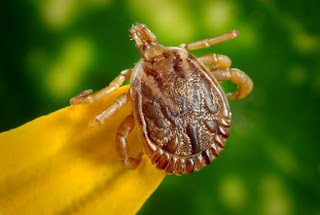What’s bugging you this summer? It could be those pesky mosquitoes buzzing around your head, or maybe that sticky tick that latched onto your leg during your woodland hike.
In fact, we’re experiencing a bumper crop of ticks, thanks to an explosion in the population of their favorite hosts – mice, chipmunks and deer. Part of the problem can be blamed on the milder winters, which has prevented many of these biting bugs as well as their hosts from dying off in the cold. That means there are more than enough ticks to go around. To make matters worse, ticks can even hitch a ride on migrating birds, which carry them to new locations to colonize. That, in turn, increases the odds that you, your children or your pets will become the source of their next blood meal.
But when it comes to these bloodsucking parasites, there’s more to fear than just their bites. According to Dr. Jorge Parada, infectious disease specialist and medical advisor for the National Pest Management Association (NPMA), ticks and mosquitos can also carry some nasty diseases. The Centers for Disease Control and Prevention (CDC) recently reported that disease cases from mosquito, tick and flea bites tripled in the U.S. from 2004 to 2016. Ticks are known to carry more than 65 different illnesses. Rocky Mountain Spotted Fever, for example, can be fatal. There’s also Lyme Disease, which is not typically fatal, but can still lead to illness. Mosquitoes are also disease carriers, but thankfully, in this country, the dominant mosquito-borne infection is West Nile Virus, which is rarely fatal.
Of course, there’s no need to spend the entire summertime behind closed doors. Instead, take a few precautions to make it harder for these pesky pests to turn you into their next meal. Before you go outside, apply insect repellant -- it works well at keeping ticks and mosquitoes away. If you’re going for a hike, wear long sleeved shirts, long pants, and even tuck your pant legs into your socks to keep ticks from finding bare skin that they can latch onto.
On the home front, the last thing you want is for ticks or mosquitoes to set up shop in your back yard. Both of these bugs love tall, unkempt lawns, shaggy shrubbery and debris. And when it rains, it pours for mosquitoes, which need only a bottle cap filled with water to breed and multiply.
An important way to stay safe from bug bites at home is by talking to a pest professional, who’s armed with the knowledge to help homeowners protect themselves from an infestation. They can inspect your property and outline some chemical-free steps you can take to keep these critters at bay. For example, check to make sure your screens are intact and that they don’t have any tears where mosquitoes can enter your home. It also helps to keep your lawn mowed and to remove any debris that could provide a home for mosquitoes and ticks.
And finally, after you spend time outside, it’s wise to do a tick check. If you happen to find one of these creepy crawlies on your body, don’t panic. A tick needs to be latched onto you for 24-to-48-hours before you can get infected with Lyme Disease. So, grab a trusty pair of tweezers, which will do the trick of tick removal. Just be sure to place the tweezers as close as possible to your skin and pull firmly and gently without twisting to avoid leaving any of the tick’s mouth embedded in your skin.
Want more helpful mosquito and tick tips? To learn more about these tiny bloodsuckers and how to avoid getting “ticked off” this summer, visit pestworld.org.




Thanks for the info. I am terrified of getting a tick while out golfing. I didn’t know about the 24-48 hours before Lyme disease!
ReplyDeleteThe Centers for Disease Control and Prevention (CDC) recently reported that disease cases from mosquito, tick and flea bites tripled in the U.S. from 2004 to 2016. Ticks are known to carry more than 65 different illnesses. Rocky Mountain Spotted Fever, for example, can be fatal. There’s also Lyme Disease, which is not typically fatal, but can still lead to illness. Mosquitoes are also disease carriers, but thankfully, in this country, the dominant mosquito-borne infection is West Nile Virus, which is rarely fatal. Cockroach Control in Romford
ReplyDelete